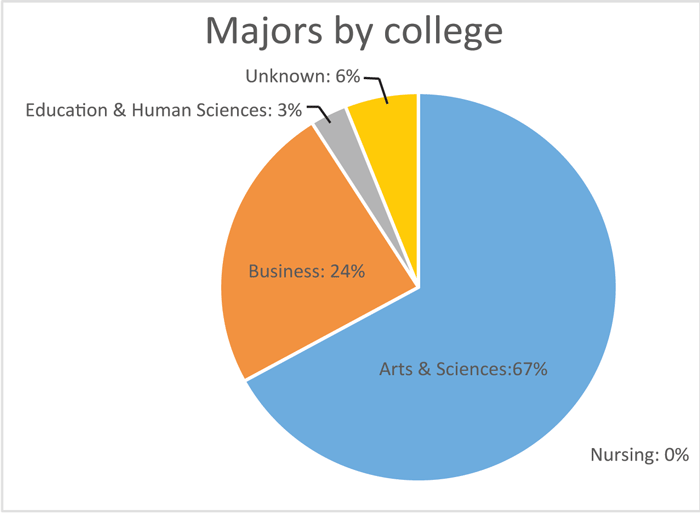Senate doesn’t mirror student body makeup
Spectator survey shows snapshot of group’s demographics
April 2, 2014
UW-Eau Claire Student Senate, while directly representing some student groups many times over, also under-represents — or some cases, not at all — other slices of the student population, results of a recent demographic survey show.
The Spectator gathered data of student senators by sending out surveys requesting information such as race, ethnicity, major and any campus organization affiliations.
The data include all but two members of Senate.
Racially, Student Senate is resoundingly white. According to the UW-Eau Claire Factbook for academic year 2013-2014, about 90 percent of the student body is also white.
The Factbook states three percent of Eau Claire students are Asian, one percent are black and two percent are two or more races. Just one senator would be a representation equivalent of the student population of these races.
Two percent of students are Hispanic, and one senator identifies as such.
Racial and ethnic makeup on Senate is not something any student official can directly change. It cannot force students who are a racial or ethnic minority to run for a seat, but the organization does have outreach and inclusivity initiatives.
Student Body President Bryan Larson said inclusivity for any under-represented student group is an area of weakness he would like to see improve.
“That’s been our job as a senate, is to make sure we are reaching out, so even if no one gets elected who is (for example) a nursing major, that we are still talking to nursing majors,” he said. “And to be quite frank, it’s something I think we can improve on. I think it’s one of our biggest flaws right now, we aren’t quite as engaged with some of these groups that aren’t represented on campus.”
Junior Paul Soulier is running for a spot on the next Senate session. He is a member of the Red Cliff Chippewa Nation.
He said he does think the current racial and ethnic homogeneity means Senate ignores certain issues, but having more diverse viewpoints could bring attention to otherwise overlooked issues.
“What (more diversity) would do is give a different viewpoint on certain things,” he said. “If there are things that really impact students of color or other groups like that, (Senate) might not be aware of it so it might be a good idea to bring it up,” he said.
Parts of campus academia are under-represented as well, while certain areas have the opposite issue.
There are at least eight political science majors on Senate, making up about a quarter of the body. In comparison, the major makes up about one-tenth of one percent of the undergraduate student body as a whole.
For another extreme, there is no one on Senate that is a member of the College of Nursing & Health Sciences. This school has about 930 students, according to the Factbook.
The nature of programs like political science make it apparent why so many would also want to serve on Senate, Larson said. He added some universities have seats on their student governments devoted to certain programs, but he likes Eau Claire’s method better.
“I know specifically I saw a ballot for (UW-)Madison … they had the various colleges, and I think that makes you think differently,” he said. “You think more, ‘What can I get for my fellow business students?’ or, ‘What can I get for the Greek system?’ or however it’s broken down.”
He said he thinks Eau Claire, alternatively, “forces more collaboration and makes people think more holistically.”
Certain campus organizations have a large representation on campus. There are at least 12 senators who are also members of one of the six Greek chapters on campus. This makes up about 36 percent of Senate.
There are at least five senators involved in a partisan or activist political organization on campus, or about 15 percent.
Senator and President of the Intrafraternity Council Sam Fish explained the reason there are so many Greek members on senate, especially Delta Tau Delta (of which Fish is also a member), is partly the result of recruitment efforts of the fraternity.
“Fall semester of 2012 our chapter was a colony,” he said. “We had 11 guys and it looked like we were about to fail. My brother Cory Fish was (student body) president at the time so he reached out to members of Senate who were his close friends.”
Delta Tau Delta is now an official chapter, partly as a result of this recruitment. Fish said he thinks after these senators graduate there will probably be fewer Greek members serving on Senate.
Larson said senate has protocol dealing with any possible conflicts of interest.
“You’re legally required to recuse yourself from any deliberations of funding for a group you are directly involved in,” Larson said, adding Senate does not run into this conflict too often because senators are largely not involved in most of the programs that receive Senate funding.
Fish is seeking election as the next student body president. He said if he were elected, he would step down from his position as president of Intrafraternity Council to eliminate any possibility of a conflict of interest.
Fish said Senate could attempt to be more inclusive of students, especially when filling vacancies.
“So often in the appointment process you look at just people who apply, you don’t proactively go out and find people that would be good people and try to bring them in.” he said.
Fish said Senate could reach out to groups who aren’t directly represented, such as the Hmong Student Association or Black Student Association, and encourage them to apply for vacant positions.
Student Senate elections will take place April 14-16.











